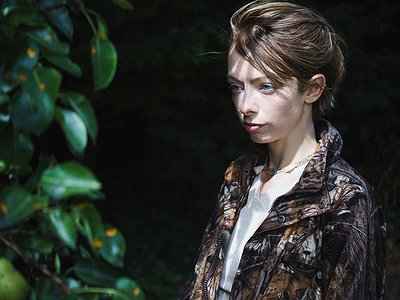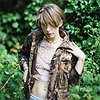Part 2
Can you talk about a breakthrough work, event or performance in your career? Why does it feel special to you? When, why and how did you start working on it, what were some of the motivations and ideas behind it?
Hotel Rosemary was the first electronic album that I wrote on synth, which I recorded with a budding producer & engineer who I met at an open mic in York. The following year I lived in France and didn’t have the means to record.
In some ways Cameras From Mars was a breakthrough work, because it was my first self-produced electronic album integrating everything I’d acquired and learned so far. I started working on it around 2015. The synth parts for "One Day Old Today" I had recorded previously with my neighbour when living in Toulouse. I had electronically produced many songs and half-formed albums in the year leading up to Cameras From Mars (the final year of my French & Linguistics degree) but had moved on from those ideas in pursuit of more abstract creations that weren’t focussed around lyrical/song form but more on the atmosphere, mood and aesthetic. The album captures the emotions I felt in the uncertain time following uni, when I’d returned to live with my parents for a while and didn’t know where I was going next.
LUPA was a breakthrough in the way that making it altered the way I live my life. It was a spiritual breakthrough album which will effect everything I make from then onwards. Ghostcats was a byproduct of that album.
There are many descriptions of the ideal state of mind for being creative. What is it like for you? What supports this ideal state of mind and what are distractions? Are there strategies to enter into this state more easily?
I could create in any state and I believe that showing up is the most crucial part, but I still put a lot of importance in nourishing my soul in preparation for creation. It is ideal for me to be grounded, comfortable, peaceful, introspective and open to receiving.
The mood I’m in influences my creative choices, for example playing guitar can be very cathartic, and playing it often leads to a song. I find that movement, meditation and reflection support the mind state that allows flow; improving my connection with self leads to more powerful and truthful creations. I do those things to look after my mental health anyway, but it has a very direct effect on the music I create.
I also find that relocating and making any significant change or advancement in my life brings with it a wave of fresh inspiration. Elsewhere it helps me to feel properly alone and to have silence; the sound of people going about their day or chatting as well as social media and messaging can take me out of the zone, but if I’ve put that inner work in it’s nothing I can’t handle.
Music and sounds can heal, but they can also hurt. Do you personally have experiences with either or both of these? Where do you personally see the biggest need and potential for music as a tool for healing?
Yes, there is some music that hurts, more so when I’m extra-sensitive. Incredibly loud or abrasive sounds, tasteless, plastic, politically offensive, brainwashing content, or songs that remind you of someone or something you don’t want to think about, I guess you could say that hurts.
In so far as healing, music can really help us go inwards. I turn to music to help me sit with and process emotions. The right thing can dissipate tensions, helping you relax and let go, when you would otherwise be restlessly writhing and searching for a way out of the feeling. That to me is a powerful healing tool. Similarly it can inspire you to dance which is an incredibly healing activity, a way to alchemise and release whatever you are working through.
There is a fine line between cultural exchange and appropriation. What are your thoughts on the limits of copying, using cultural signs and symbols and the cultural/social/gender specificity of art?
There is appropriation when privileged artists imitate underground and marginalised artists and repackage it as their own. The fixation on identity and relentless drive of fashion and consumerism means that this is a trap many fall into. It’s the difference between deriving your entire sound from other people’s innovations, and learning through listening and then finding your own expression, honestly integrating the subtleties that resonate with you on an emotional, cultural and intellectual level.
Every human has a unique set of strengths and experiences, so each has their own part to play in our collective evolution. The more we are true to ourselves the better. We can be inspired by the expressions of others, and choose to take a part in that movement- and thus we move together, and harmonise. We just have to be mindful and respectful when taking things out of context, giving credit, support and acknowledgment to its origins.
Our sense of hearing shares intriguing connections to other senses. From your experience, what are some of the most inspiring overlaps between different senses - and what do they tell us about the way our senses work?
It connects directly to emotions, impulses, physical sensations, memories and visualisations. I’m inspired by the changes in perspective and mood, how that links to the way we see, think and feel. It shows how influenced we are by vibrations and frequencies. I feel it takes us back to our essence, reminding us of what matters, washing away niggling thoughts and replacing them with deeper feeling and presence.
Art can be a purpose in its own right, but it can also directly feed back into everyday life, take on a social and political role and lead to more engagement. Can you describe your approach to art and being an artist?
As someone who devoted their life to music and identifies as an artist, I see it as my duty to give something of value. I honour the world and the life it gives me by putting music into it. I feed my mind and body with whatever improves my own life, and allow that substance to emerge through intuitive methods of creation. I like to daydream and observe, admiring the beauty of nature and people, reflecting on questions and sentiments, that inspire me.
On an everyday level my artistic projects are never far from my mind. It can be productive to go for walks, do housework or just gaze out the window when I have something on loop in my head, as it lets my mind wander and arrive at new ideas. Elsewhere I’m always writing things down, I have to be ready to catch interesting thoughts and words so that I may use them at a later time when I need lyrics.
What can music express about life and death which words alone may not?
The intangible, the unknowable and the timeless. The mystical realms of imagination, energy and frequency are like a divine channel, allowing us to express the beauty, pain, rawness and abstraction of living and dying in a way that we can’t through language alone. It’s a pure gift that enables surrender and exaltation in aliveness. Non verbal forms of communication can often be the most powerful.






